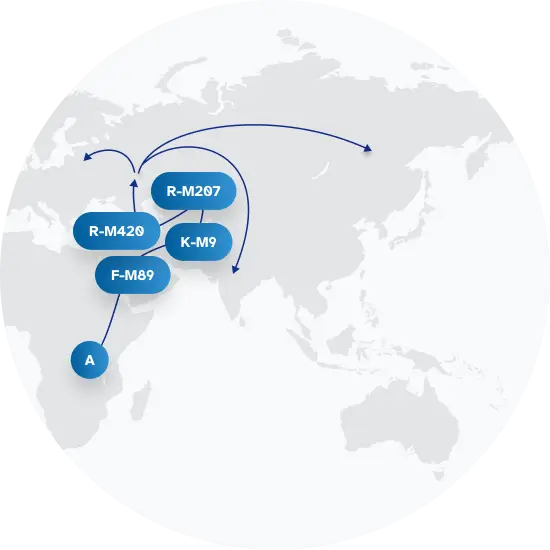Explore the Family Name Krol
How common is the last name Krol in the United States?
Based on the Decennial U.S. Census, the surname Krol has seen a slight dip in popularity between 2000 and 2010. In 2000, it was ranked at 8076, but by 2010, it had fallen to an 8235 ranking, which is a change of -1.97%. However, despite this drop in rank, the actual count of individuals with the Krol surname increased from 3781 to 4025, a rise of 6.45%. This meant that proportionally, out of every 100,000 people, there were 1.4 with the surname in 2000, dropping slightly to 1.36 in 2010, a decrease of 2.86%.
| 2000 | 2010 | Change | |
|---|---|---|---|
| Rank | #8,076 | #8,235 | -1.97% |
| Count | 3,781 | 4,025 | 6.45% |
| Proportion per 100k | 1.4 | 1.36 | -2.86% |
Race and Ethnicity of people with the last name Krol
The ethnic identity associated with the Krol surname also shifted between the years 2000 and 2010, according to data from the Decennial U.S. Census. The majority of Krols identified as White, accounting for 96.75% in 2000 and 96.25% in 2010. However, there were noticeable changes in other ethnicities. Those identifying as Hispanic saw an increase of 70.75%, rising from 1.06% to 1.81%. Also, the percentage of those identifying as Black rose significantly by 261.54%, from 0.13% to 0.47%. On the other hand, the percentage of Krols identifying as Asian/Pacific Islander and those claiming two or more races both saw decreases, by 28.57% and 42.98% respectively. The proportion of Krols identifying as American Indian and Alaskan Native remained relatively steady, with only a small increase of 4.00%.
| 2000 | 2010 | Change | |
|---|---|---|---|
| White | 96.75% | 96.25% | -0.52% |
| Hispanic | 1.06% | 1.81% | 70.75% |
| Two or More Races | 1.14% | 0.65% | -42.98% |
| American Indian and Alaskan Native | 0.5% | 0.52% | 4% |
| Black | 0.13% | 0.47% | 261.54% |
| Asian/Pacific Islander | 0.42% | 0.3% | -28.57% |
Krol ancestry composition
23andMe computes an ancestry breakdown for each customer. People may have ancestry from just one population or they may have ancestry from several populations. The most commonly-observed ancestry found in people with the surname Krol is Eastern European, which comprises 53.1% of all ancestry found in people with the surname. The next two most common ancestries are British & Irish (18.3%) and French & German (10.7%). Additional ancestries include Ashkenazi Jewish, Italian, Scandinavian, Spanish & Portuguese, and Finnish.
Ready to learn more about your ancestry? Get the most comprehensive ancestry breakdown on the market by taking our DNA test. Shop 23andMe
| ANCESTRY BREAKDOWN | COMPOSITION |
|---|---|
| Eastern European | 53.1% |
| British & Irish | 18.3% |
| French & German | 10.7% |
| Other | 17.9% |

Possible origins of the surname Krol
Your DNA provides clues about where your recent ancestors may have lived. Having many distant relatives in the same location suggests that you may all share common ancestry there. Locations with many distant relatives can also be places where people have migrated recently, such as large cities. If a large number of individuals who share your surname have distant relatives in a specific area, it could indicate a connection between your surname and that location, stemming from either recent ancestral ties or migration.
Based on 23andMe data, people with last name Krol have recent ancestry locations spanning a few countries, mostly in Poland, and the United Kingdom of Great Britain and Northern Ireland.
| RECENT ANCESTRY Location | Percentage |
|---|---|
| Masovian Voivodeship, Poland | 71.00% |
| Podkarpackie Voivodeship, Poland | 71.00% |
| Lesser Poland Voivodeship, Poland | 69.20% |
| Podlaskie Voivodeship, Poland | 65.40% |
| Lublin Voivodeship, Poland | 57.90% |
What Krol haplogroups can tell you
Haplogroups are genetic population groups that share a common ancestor on either your paternal or maternal line. These paternal and maternal haplogroups shed light on your genetic ancestry and help tell the story of your family.
The top paternal haplogroup of people with the surname Krol is R-CTS3402, which is predominantly found among people with European ancestry. Haplogroup R-CTS3402 is descended from haplogroup R-M420. Other common haplogroups include I-M170 and R-L260, which are predominantly found among people with European and European ancestry. Other surnames with similar common haplogroups are: Mazur, Nowicki, Wisniewski, Michalski, Zielinski, Lewandowski, Jablonski, Nowak, Novak, Kowalski.
The most common maternal haplogroups of people with Krol surname are: H1, N, H. These most commonly trace back to individuals of European ancestry.
 Paternal Haplogroup Origins R-M420
Paternal Haplogroup Origins R-M420Your maternal lineage may be linked to Marie Antoinette
Because it is so dominant in the general European population, haplogroup H also appears quite frequently in the continent's royal houses. Marie Antoinette, an Austrian Hapsburg who married into the French royal family, inherited the haplogroup from her maternal ancestors. So did Prince Philip, Duke of Edinburgh, whose recorded genealogy traces his female line to Bavaria. Scientists also discovered that famed 16th century astronomer Nicolaus Copernicus traced his maternal lineages to haplogroup H.

What do people with the surname Krol have in common?
Spoiler alert: it's complicated. People with the same last name are usually no more genetically similar than a randomly sampled group of people from the same population. That said, people with the same surname are more likely to have similar ancestries than randomly sampled individuals. The reason is the tendency of people with similar cultural or geographical backgrounds to preferentially mate with one another. That's why people who share a surname may be more likely to share traits and tendencies in common than people within the general population. Check out the percentages below to see the prevalences of tastes, habits, and traits of people with your surname compared with prevalences among 23andMe users.
Preferences
Traits
Habits
Wellness

Migraine
A severe headache characterized by intense pain, sensitivity to light and sound, and often accompanied by nausea and vomiting.
"Krol" Surname 19.1%
23andMe Users 16.4%
Are health conditions linked to the last name Krol?
The short answer is that, if there is an association between surname and health, it's usually more about your ancestry than your name. Individuals with a given surname are no more genetically similar than the general population but often have similar ancestries. The populations of people associated with those shared ancestries often have sets of genetic variations, also known as alleles, in common. Some of those alleles are associated with a greater likelihood of developing certain diseases.
Disease variant frequency by ancestry
Disease allele frequencies in populations associated with the surname Krol are shown below. Important Note: not everyone with a disease allele will develop these health condition












